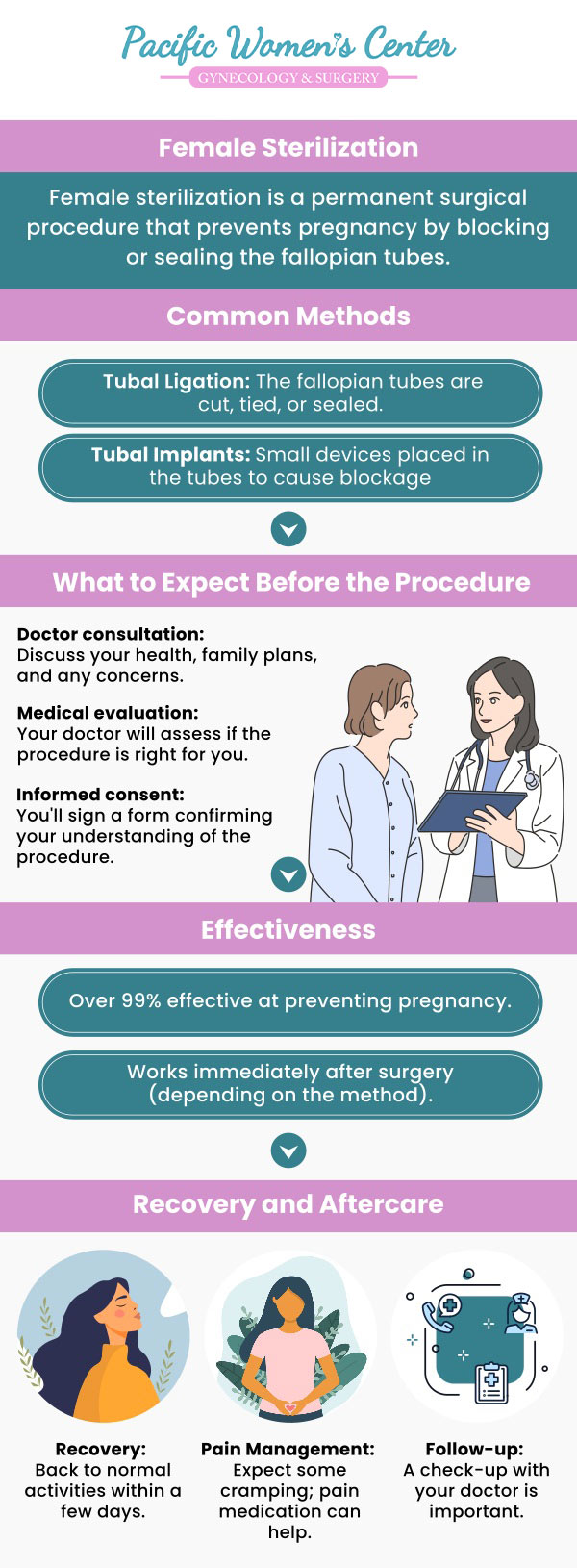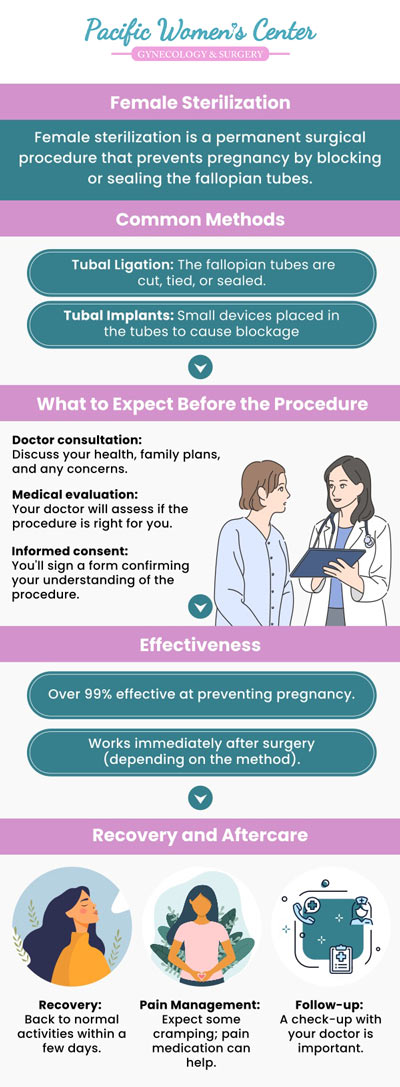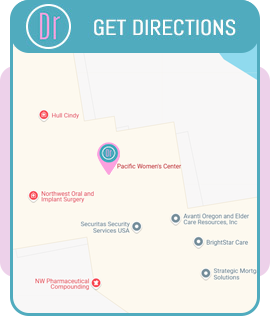Female Sterilization Treatment in Eugene, OR
Sterilization is a highly effective approach to preventing pregnancy. If you want to avoid unwanted pregnancies, Dr. Richard Beyerlein and Dr. Tamara A. Stenshoel at Pacific Women’s Center provide sterilization and ensure the highest levels of infection control and safety in medical environments. For more information, contact us or schedule an appointment online. We are located at 911 Country Club Rd. Suite 222, Eugene, OR 97401.




Table of Contents:
What is sterilization birth control?
Does female sterilization get rid of periods?
At what age can a woman be sterilized?
How much does it cost for a woman to be sterilized?
We recognize that choosing a permanent birth control method is a significant personal decision. Sterilization birth control provides a highly effective, permanent solution for individuals and couples who are confident they do not wish to have more children or have decided not to have children at all. At Pacific Women’s Center, we are dedicated to offering compassionate, personalized care and thorough counseling to help you make informed decisions regarding your reproductive health.
For women, sterilization typically involves a procedure known as tubal ligation, commonly referred to as “having your tubes tied.” During tubal ligation, the fallopian tubes—which transport eggs from the ovaries to the uterus—are surgically blocked, tied, cut, or sealed. This prevents eggs from being fertilized, effectively eliminating the possibility of pregnancy. Our experienced healthcare team offers minimally invasive laparoscopic techniques and traditional surgical methods and can also perform sterilization procedures during a cesarean section if desired.
For men, sterilization is achieved through a vasectomy. During this outpatient procedure, our skilled medical providers surgically cut or seal the vas deferens—the tubes that carry sperm from the testicles. As a result, sperm cannot enter the semen, preventing fertilization. A vasectomy is typically quick, minimally invasive, and associated with minimal discomfort and rapid recovery.
It’s important to understand that sterilization methods do not prevent sexually transmitted infections (STIs). Patients should continue using condoms or other protective measures for STI prevention when appropriate. Furthermore, sterilization procedures are considered permanent, and although reversal surgeries exist, they can be complicated, expensive, and not always successful.
Female sterilization is a permanent contraceptive procedure designed to help women effectively prevent pregnancy by blocking, cutting, or sealing the fallopian tubes. Many patients wonder if sterilization will affect their menstrual cycles; however, sterilization itself typically does not impact menstruation. This is because the ovaries continue to function normally, releasing eggs and producing hormones that regulate your cycle.
After undergoing sterilization, most women experience menstrual periods similar to those they had before the procedure, including frequency, duration, and amount of bleeding. If you do notice changes in your menstrual cycle following sterilization, it often relates to other factors such as age-related hormonal changes, underlying medical issues, or the discontinuation of previously used hormonal contraceptives.
At Pacific Women’s Center, your reproductive health and comfort are our priority. If you are considering female sterilization and have questions or concerns regarding menstrual changes or managing menstrual bleeding, we encourage you to schedule a consultation with us. Our experienced provider is here to provide personalized guidance and compassionate care tailored specifically to your health goals and individual needs.
We understand that decisions regarding female sterilization are deeply personal and require careful consideration. We emphasize personalized care, thorough counseling, and informed decision-making when it comes to permanent contraception options like sterilization.
Eligibility for sterilization procedures at our practice is evaluated individually, taking into account multiple factors, including medical considerations, emotional maturity, reproductive goals, and ethical guidelines, rather than relying solely on age criteria. While there is generally no strict legal minimum age for sterilization, our healthcare providers emphasize the importance of comprehensive counseling, particularly for younger women or those without children, to ensure they fully understand the permanent nature and potential long-term implications of this procedure.
Because of concerns regarding possible future regret, our providers follow professional guidelines and best practices by recommending caution and thorough exploration of all contraceptive options for younger patients, typically those under 25 or those without children. At Pacific Women’s Center, our commitment to patient-centered care ensures that each woman considering sterilization receives personalized counseling, understands alternative contraceptive methods available, and fully appreciates the risks and benefits associated with permanent sterilization.
We understand that decisions about sterilization procedures are significant and highly personal. Our office offers comprehensive counseling and expert guidance on sterilization options, including surgical techniques such as tubal ligation and minimally invasive methods.
Costs associated with female sterilization procedures can vary depending on factors such as the specific procedure chosen, anesthesia requirements, and individual healthcare plans. Typically, without insurance coverage, surgical sterilization can range between $1,500 and $6,000 or more. However, many insurance providers, including Medicaid, often cover sterilization procedures partially or fully, provided eligibility criteria and consent requirements are satisfied.
Our dedicated medical team is committed to providing transparent, detailed information regarding procedure options, associated costs, and insurance coverage. We encourage patients considering sterilization to schedule a personalized consultation with us. Our staff will gladly discuss your unique circumstances, clarify insurance benefits, and help identify financial assistance programs and coverage options available to you. For more information, contact us or schedule an appointment online. We are located at 911 Country Club Rd. Suite 222, Eugene, OR 97401. We look forward to serving you! We serve patients from Eugene OR, Springfield OR, Coburg OR, Creswell OR, Cottage Grove OR, Lowell OR, and Junction City OR.

ADDITIONAL SERVICES YOU MAY NEED
❱ Abdominal Hysterectomy
❱ Bladder Lift Surgeon Q&A
❱ Cervical Cone Biopsy
❱ Colposcopy
❱ Endometrial Ablation
❱ Endometrial Biopsy
❱ Female Sexual Dysfunction
❱ Gynecological Surgery
❱ Gynecology
❱ Hormone Therapy
❱ Vaginal Hysterectomy
❱ Endometriosis Diagnosis & Care



